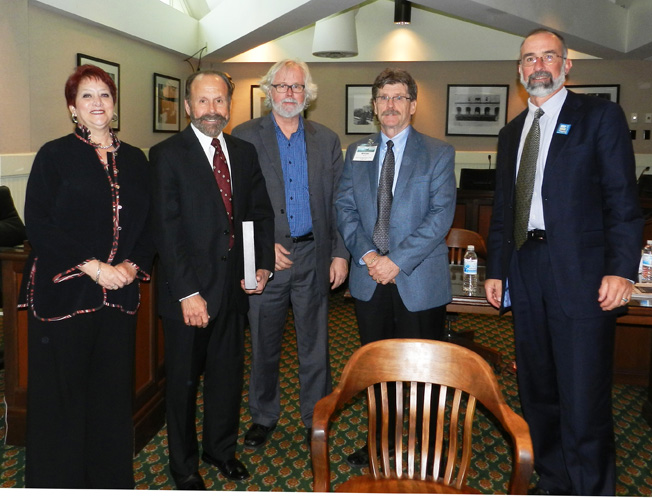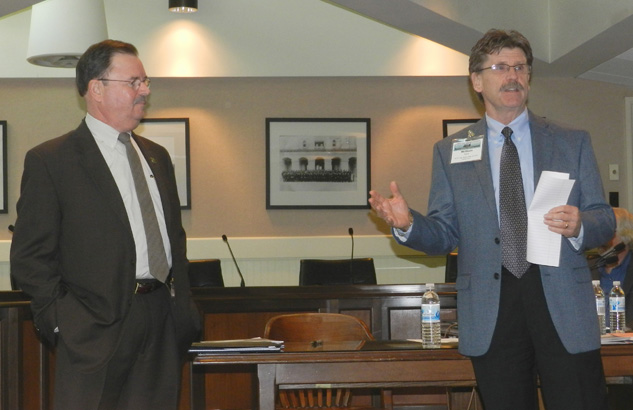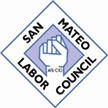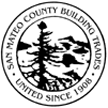Bay Area Legislators Support Pro-Labor Bills
The San Mateo County Central Labor Council and San Mateo County Building Trades Council hosted a series of meetings with Bay Area legislators in Sacramento March 18 along with the San Francisco Labor Council and SF Building Trades Council. State Senators Jerry Hill, Leland Yee, and Mark Leno and Assembly Members Rich Gordon, Kevin Mullin, Phil Ting and Tom Ammiano were asked to support the labor issues and bills by representatives from the building trades, public sector, and private sector unions.

San Mateo Labor Council Executive Secretary-Treasurer Shelley Kessler, Senator Jerry Hill, SF Labor Council Executive Director Tim Paulson, SM Building Trades Council Business Manager Bill Nack, and SF Building Trades Council Secretary-Treasurer Mike Theriault.
The Bay Area legislators expressed strong support for Labor’s 2014 legislation. Many had voted overwhelmingly in favor of labor’s bills in the 2013 legislative session. The meetings were part of the Joint Legislative Conference sponsored by the California Labor Federation and the State Building Trades Council.
2014 Legislative Agenda: Working People Standing Together
The California Labor Federation’s 2014 Legislative Agenda challenges the dismantling of good jobs in order to rebuild the middle class through working people standing together.
The Labor Federation notes that, “Today in California we face the greatest level of income inequality on record and the disappearance of the middle class. Over the past few decades, the bargaining power of workers has steadily declined. The result has been the loss of economic stability and opportunity for millions of California families.
“When unions were strongest, working people generally earned decent wages and fair benefits. Consumer spending increased, people bought homes and cars with their middle-class wages, and the economy hummed. When corporate bosses took the offense to erode union membership in the 1970s, it became much harder for workers to organize for a better life. Corporations now make higher profits than ever before, while the poverty rate in California is growing three times faster than the population. The average wage in California is at a 30-year low, while income for the wealthiest Californians is at an 80-year high.”
Items on Labor’s Legislative Agenda include:
• Protection for Workers in the New Economy
• Shining a Light on Subsidies for Low-Wage Work
• Controlling Health Care Costs
• Building High-Speed Rail
• Improving Assistance to Laid-Off Workers
• Letting Workers Earn Paid Sick Days
• Protecting Immigrant Workers
• Protecting Retirement Security
Labor supports efforts to address the issues of jobs in today’s economy that are temporary, part-time, or contracted out. The Labor Federation supports the rights of all workers to be paid for their work, to have safe workplaces, and to have the right to organize, regardless of how they are hired. Too often, employers use third-party labor contractors to force down wages and escape liability. Workers may remain temporary for years, with no guarantee of hours or assignments, no protection from retaliation, and no recourse when the labor contractor disappears without paying them. All the Bay Area legislators said they would support AB 1897, which would ensure that employers are held accountable for wage theft and other abuses when they use staffing agencies and other labor contractors to supply workers. Assembly Member Ting said,
“We are seeing so many temporary workers replace permanent workers; it’s important that they are protected.” Asm. Gordon said the bill was being amended but that he supports the concept. Asm. Tom Ammiano said it was very important and that when companies use temporary workers, it drives down wages.
The Bay Area legislators also expressed support for AB 1792, which will require transparency from employers like Wal-Mart that pay workers so little that they qualify for public benefits. California taxpayers foot the bill to subsidize major corporations when they force workers onto public programs. Ammiano said he supported AB 1792 and added, “Look at Prop 13 loopholes. Big corporations haven’t paid their fair share” of property taxes.
On the issue of containing health care costs, Ian Lewis of UNITE HERE Local 2 asked for support of transparency in how health care premium dollars are spent. He noted that health care costs are still a major issue in contract negotiations, and that union members, unions, employers, and the economy are struggling under the weight of ever-increasing health care costs. Senator Leno noted that health care costs have continued to rise and could be as much as 25 percent of the Gross Domestic Product by 2030. Senator Yee said cost containment was needed and insurers shouldn’t make high profit margins off the high premium costs to consumers. Asm. Mullin noted that the Senate bill would likely be modified before it reaches the Assembly, but that he is generally supportive of the bill. Assemblyman Ammiano stated that he was still an advocate for single payer, and that “The single payer movement is not going away.” He said he supported legislation that would “create a road to single payer,” such as the bill passed in Vermont.
The legislators were asked by Victor Torreano of Sheet Metal Workers 104 about their position on a proposal by Governor Brown to use funds from the state’s “cap-and-trade” program to help fund high-speed rail. He noted that the high-speed rail project will bring hundreds of thousands of good union jobs to the areas of the state hardest hit by the recession, and that public investment in high-speed rail is critical to rebuild our economy and to ensure that California has adequate transportation for our growing population.
All the members said they supported high speed rail; some had reservations about using the funds established by AB 32 that are supposed to address the impacts of climate change. Assemblyman Rich Gordon said he firmly and strongly supported high-speed rail. “The governor’s proposal will face challenges,” he said. “We’ve got to do it.” Senator Leno said he strongly supported high-speed rail and that, “We’ve got to build it. We can’t build more freeways to accommodate the 11 to 12 million more people we will have in the State, and we don’t have the land for more airports.” He said that AB 32 was very specific about how cap and trade funds could be spent, and that when voters approved the bond to fund high-speed rail, it did not include using cap and trade funds. “We need to make the project attractive to private investors to fund it,” he said. Assemblyman Mullin said he supported building high-speed rail, and that, “We should look at it as a generational issue, as we plan for 50 million people. My concern is also that high-speed rail will lead to the electrification and modernization of Caltrain, which is the backbone of transportation from the Silicon Valley to San Francisco through the Peninsula. It has job-creating power in that corridor in my district and could spawn more transit-oriented development.” Assemblyman Ammiano said he strongly supported the electrification of Caltrain and high speed rail.
All the Bay Area members said they would support AB 1522, which would allow all workers to earn paid sick days. It would ensure that workers can afford to use their health care or take a day off when they are too sick to work.

Assembly Member Rich Gordon was introduced by SM Building Trades Council Business Manager Bill Nack as a strong supporter of prevailing wages for building trades workers.
Other Building Trades Issues
David DeLaTorre of Laborers Local 261 asked for support of AB 1331, Governor Brown’s plan for a water infrastructure bond, which would create thousands of construction jobs. Senator Hill said, “We need to improve water quality” and that the latest bond proposal has a better chance of passing since it cuts some of the “pork” that was part of previous measures.
Assemblyman Rich Gordon said a key challenge is the state’s response to the drought and investing in the state’s water infrastructure. He said he was part of the working group on water that was developing some solutions, and supports the water bond. Senator Leno said he didn’t support it last year because of the costs and public opposition to some parts of the measure. “I’m concerned about the need for continuous funding,” Leno said. “I want to support it but it needs to be tweaked.” Asm. Mullin also said he supported AB 1331, and served with Asm. Gordon to represent the Bay Area on the working group on water. “The drought is shining a light on the need to improve the water infrastructure,” he said. “We have to show the public that this measure doesn’t have pork and will benefit the Bay Area and the state.” Senator Yee and Assembly Members Ting and Ammiano also expressed support. Ting said it was important that the bond be fair and funding go to improve the whole system. Ammiano said after voters were angered by the earmarks in prior bond proposals, “We refined the process and made good changes. We included different interests so I am hopeful and supportive.” Ammiano also noted that the drought has focused attention on water use issues, commenting that, “It doesn’t make sense to use water for fracking.”
Mike Theriault of the SF Building Trades Council asked the legislators their position on putting a school construction bond on the ballot through AB 2233. Senator Hill said he would support it, but that there may be a problem getting a two-thirds vote in the State Senate to put it on the ballot. Assemblyman Mullin said he supported it but that he wanted it to be successful, and that in the 2016 Presidential election there would be a higher turnout of voters who would likely support it. Assemblyman Ting agreed that 2016 would be a good time to put the bond on the ballot.
Scott Wein of IBEW Local 617 asked for support of AB 1581, which would require that school districts pre-qualify contractors when they use the “lease-back” program for construction projects. All of the representatives were supportive.
State Budget
Becky Nassarre of AFSCME Local 829 asked legislators to support restoring funding for courts. Asm. Gordon said the state had put $100 million back into the budget for courts but, “it isn’t enough. Justice is being denied, especially in family court,” he said. Asm. Ting said that with a budget surplus, “We have a little more money now, and everything that we took a hatchet to needs to be replenished.”
Senator Mark Leno said while the State now has a budget surplus, there have been $1 billion in cuts to the UC, CSU and City College systems, as well as to courts and the social safety net. Leno, who chairs the Senate Budget Committee, said that of the current $11 billion projected surplus, $7 billion would go to education funding per Prop. 98. He said the other $4 billion should be divided equally between paying down debt, setting aside money in a rainy day fund, and restoring services. He noted that under the Governor’s plan 90 percent of the $4 billion would be spent to pay down debt, and there would only be roughly $400 million for restoring services cut in prior budgets. He added that the state legislature and the Governor are also trying to deal with the unfunded pension liabilities in the public employees’ and teachers’ retirement systems. Leno said that in the near future, unless Prop 30 funding for education is extended, “in a couple of years the $11 billion could become nothing; we could be back where we started.”
Assembly Member Ting pointed out that questions about spending were important but that, “We also need to look at the revenue side, and take a harder stance regarding taxes.” Ting said raising revenue would ensure that, “we aren’t just talking about fighting over crumbs but about replenishing and rebuilding the California Dream.” He called for a fair tax system, in which taxes are paid by those who can afford to pay. “We have to look at the revenue side or we won’t be able to do what’s needed,” Ting said. “We should be saying it’s OK to have free higher education.”
Other issues and bills
Alisa Messer of AFT 2121 highlighted the issues of CCSF. She said AB 1942 by Assembly Member Rob Bonta would reform the accreditation process. Senator Leno’s SB 965 would restore some funding for the community colleges. Assemblyman Rich Gordon said, “maintaining CCSF has to be a priority.” Assemblyman Mullin said CCSF is a critical resource. “I serve on the WIB [Workforce Investment Board] and I see every day the value of the Community Colleges,” he said. “They play a critical role in rebuilding the middle class by retraining people for new jobs.” Phil Ting said keeping CCSF open was a priority.
Mark Leach of IBEW 617 and San Mateo Labor Council Executive Secretary-Treasurer Shelley Kessler asked Senator Hill to continue to support efforts to make sure union members are employed by contractors who use the San Mateo Events Center. Leach suggested that the state legislature could play a role in helping define the wage standards for the County facility.
Steve Lutge of IATSE 16 asked for support of AB 1839, to help keep film and television production in the State. Senator Hill said he was supportive and noted that California is competing against New York, which has offered tax breaks for producers, and Canada, where labor costs are lower. The other legislators were also supportive.
All the Bay Area legislators also expressed support for restoring funding for the UC Labor Centers, which provide valuable research and information on economic issues. Assembly Member Ammiano said research by the Labor Center at UC Berkeley was very important for the development of the Healthy San Francisco program that provides health care to the uninsured.
Ammiano said he is working on restorative justice issues and had heard from incarcerated youth about problems with the state’s criminal justice system and jails.
Senator Leno said he would be introducing a new minimum wage bill, even though Governor Brown recently raised it to $9 an hour. “Income inequality has accelerated,” Leno said. “President Obama raised the minimum wage to $10.10 [for some federal contractor employees] and even conservatives now support a higher minimum wage.” Leno said his bill would raise the minimum wage to $11 an hour in 2015, and up to $13 an hour in 2017. “Having it go up a dollar a year will allow the minimum wage to keep up with inflation,” Leno noted. He said the California Labor Federation backs the bill and he is confident it will pass the Legislature, adding, “There’s no reason why the governor can’t okay it. California needs to continue to lead the debate, and just because we passed an increase doesn’t mean we have to sit back and not do more.”
Assembly Member Kevin Mullin noted that “income inequality is the issue of the day. We need to build the middle class and create more union jobs in the private sector.” He said he is aware of the high cost of living in his District, and said he wanted to partner with labor to find solutions.
Senators Leno, Hill, and Yee were presented with plaques from the CA Labor Federation for achieving 100 percent pro-labor voting records in the 2013 session.
|







